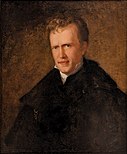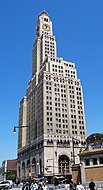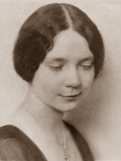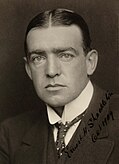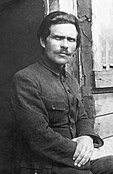Wikipedia:Today's featured article/February 2024
| << | Today's featured articles for February 2024 | >> | ||||
|---|---|---|---|---|---|---|
| Su | Mo | Tu | We | Th | Fr | Sa |
| 1 | 2 | 3 | ||||
| 4 | 5 | 6 | 7 | 8 | 9 | 10 |
| 11 | 12 | 13 | 14 | 15 | 16 | 17 |
| 18 | 19 | 20 | 21 | 22 | 23 | 24 |
| 25 | 26 | 27 | 28 | 29 | ||
February 1

Philosophy is a systematic study of fundamental questions concerning topics like existence, reason, knowledge, value, and mind. It is a rational and critical inquiry that reflects on its own methods and assumptions. Major branches of philosophy are epistemology, ethics, logic, and metaphysics. Epistemology studies what knowledge is and how to acquire it. Ethics investigates the principles of moral conduct. Logic is the study of correct reasoning. Metaphysics examines the most general features of reality. Philosophical methods include analysis of concepts and language, reliance on common sense and intuitions, use of thought experiments, description of experience, and critical questioning. Influential traditions are Western, Arabic–Persian, Indian, and Chinese philosophy. Many of the sciences were part of philosophy before they became separate disciplines. Philosophy is relevant to diverse fields of inquiry by studying their scope and concepts and providing an interdisciplinary perspective. (Full article...)
February 2
The snowy plover (Anarhynchus nivosus) is a small shorebird found in much of the Americas on both coasts and inland. Inland populations are migratory, whereas some coastal birds are resident. This plover is brown above and white below, with a white band on the neck, a slender black bill, and gray to black legs. Breeding males have black patches behind the eye and on the neck. The typical call is a repeated "tu-wheet". The bird inhabits open areas with sparse vegetation, like sandy beaches and shores of salt or soda lakes, where it feeds on invertebrates, such as crustaceans, worms, beetles, and flies. Males excavate multiple nest scrapes that are advertised to females, who may be polygamous. The species is listed as near threatened by the IUCN. The main threats are habitat destruction due to invasive beach grasses, urban development, and disturbance due to recreational uses of beaches. While conservation measures have been successful locally, the global population is thought to be in decline. (Full article...)
February 3
Brother Jonathan is an 1825 historical novel about the American Revolution. Author John Neal (pictured) was considered one of America's top novelists at the time. The story explores cross-cultural relationships and highlights cultural diversity within the Thirteen Colonies, stressing egalitarianism and challenging the conception of a unified American nation. The book's sexual themes were explicit for the period, addressing female sexual virtue and male guilt for sexual misdeeds. Scholars praised Brother Jonathan's extensive and early use of realism in depicting American culture and speech. It is Neal's longest work and possibly the longest single work of American fiction until well into the twentieth century. The editing process resulted in a number of inconsistencies in the plot. A financial failure, it received mixed but mostly warm reviews at the time. Readers of the twenty-first century are generally unaware of the book, and many scholars consider it too complex to be considered good. (Full article...)
February 4

In the 1891 English cricket season, Somerset County Cricket Club returned to first-class cricket after a five-year absence. They competed in the County Championship, which had been established the previous year. Somerset began the season poorly, drawing one and losing two of their opening three fixtures. Results improved and Somerset won five, lost six and drew one of their County Championship matches, finishing fifth in the table. The Somerset team predominantly consisted of amateur batsmen, supported by two professional bowlers. Lionel Palairet led Somerset's batting in terms of both runs and average, scoring 560 runs at an average of 31.11; he was also the only Somerset player to score a century during 1891. Somerset's professional bowlers, George Nichols and Ted Tyler, along with an amateur all-rounder, Sammy Woods, did almost all of the bowling for the county; Woods led the bowling tables with 72 wickets at an average of 17.08. (Full article...)
February 5
The Williamsburgh Savings Bank Tower is a skyscraper in Brooklyn, New York City. Designed by Halsey, McCormack & Helmer, it was constructed from 1927 to 1929 as the new headquarters for the Williamsburgh Savings Bank. At 41 stories and 512 feet (156 m) tall, the Williamsburgh Savings Bank Tower was the tallest building in Brooklyn until 2009. The bank occupied the lowest floors, while the remaining stories were rented as offices. By the late 20th century, dentists' offices occupied much of the structure. The New York City Landmarks Preservation Commission designated the tower's exterior as a city landmark in 1977 and designated some of the interior spaces in 1996. The building's upper stories were converted to luxury condominium apartments from 2005 to 2007, while the banking hall became an event space. Over the years, local residents have used the building both as a clock and as a landmark for directions, and the tower has been used as a filming location. (Full article...)
February 6
Mount Berlin is a glacier-covered volcano in Marie Byrd Land, Antarctica. It is a roughly 20-kilometre-wide (12 mi) mountain with parasitic vents. It consists of two coalesced volcanoes: Berlin proper with the 2-kilometre-wide (1.2 mi) Berlin Crater, and Merrem Peak 3.5 kilometres (2.2 mi) away with a 2.5-by-1-kilometre-wide (1.6 mi × 0.6 mi) crater. Mount Berlin has a volume of 200 cubic kilometres (50 cu mi) and rises 3,478 metres (11,411 ft) above sea level from the West Antarctic Ice Sheet. It is part of the Marie Byrd Land Volcanic Province. Trachyte is the dominant volcanic rock, occurring as solidified lava flows and pyroclastic rocks. The volcano was active from the Pliocene into the Holocene. Tephra layers from all over Antarctica have been linked to Mount Berlin, the major regional source of such tephras. The tephra was formed by explosive eruptions that generated high eruption columns. Currently, fumarolic activity occurs that forms ice towers from frozen steam. (Full article...)
February 7
Angel Aquino (born February 7, 1973) is a Filipino actress and model. She is a recipient of various accolades, including six Star Awards, two Golden Screen Awards, and a Gawad Urian. Prominent in independent films, she has also worked on television shows of varying genres, and is known for her versatility and adaptability in portraying protagonists and villains. She began her career as a model, before presenting the lifestyle show F! (1999). She achieved wider recognition for starring in Crying Ladies (2003) and Donsol (2006), which were submitted by the Philippines for Best International Feature Film at the Academy Awards. Aquino drew praise as a leading actress playing villainous roles in the drama series Magkaribal (2010), Maria la del Barrio (2011), Apoy sa Dagat (2013), And I Love You So (2015), Till I Met You (2016), and Dirty Linen (2023). Beyond film, she promotes causes, including education, gender equality, and women's rights. (This article is part of a featured topic: Overview of Angel Aquino.)
February 8
The Second War of Scottish Independence broke out in 1332 when Edward Balliol (seal pictured) led an English-backed invasion of Scotland. Balliol was crowned king but within three months was forced out of Scotland. He appealed to the English king, Edward III, who invaded Scotland in 1333 and heavily defeated a large Scottish army at the Battle of Halidon Hill. As allies of Scotland via the Auld Alliance, the French covertly supported the loyalists of David II, the Scottish king. Increasing friction caused the French king to start the Hundred Years' War. Forced to focus on the French theatre, the English lost ground in Scotland. In 1346, while Edward campaigned in France, David invaded England believing most of its previous defenders were in France. He was surprised by a sizable English force, which crushed the Scots at the Battle of Neville's Cross and captured David. After a decade of negotiation the Treaty of Berwick was signed in 1357, ending the war with the English dropping their claim of suzerainty. (Full article...)
February 9
Dorothy L. Sayers (1893–1957) was an English crime novelist, playwright, translator and critic. After achieving first class honours from Somerville College, Oxford, at a time when women were not awarded degrees, she worked as an advertising copywriter. In 1923 she published her first novel, Whose Body?, which introduced the upper-class amateur sleuth Lord Peter Wimsey; she went on to write ten more crime fiction novels about Wimsey. From the mid-1930s she wrote plays, mostly on religious themes; the play cycle The Man Born to Be King, broadcast in 1941 and 1942, was a radio dramatisation of the life of Jesus, which was initially controversial, but was soon recognised as an important work. From the early 1940s onward she focused on translating the three books of Dante's Divine Comedy into colloquial English; her first two translations were published in 1949 and 1955. She died unexpectedly during the translation of the third book, aged 64. (Full article...)
February 10
The siege of Bukhara took place in February 1220, during the Mongol conquest of the Khwarazmian Empire. Genghis Khan, ruler of the Mongol Empire, had launched an assault on the Khwarazmian Empire after being provoked by Shah Muhammad II. Genghis personally led a force of between 30,000 and 50,000 warriors across the Kyzylkum Desert to surprise the defenders of Bukhara. This city had been thought to be far from danger, and so was garrisoned by fewer than 20,000 men. After a failed sortie, the outer city surrendered on 10 February. Khwarazmian loyalists continued to defend the citadel for a further ten days, before it was breached and taken. Most of the city's population was enslaved or conscripted. Although Bukhara was then destroyed by fire, the destruction was relatively mild compared to that suffered by other cities conquered by the Mongols; within a short space of time the city was once again a centre of trade and learning, and it profited greatly from the Pax Mongolica. (Full article...)
February 11
Elizabeth Maitland, Duchess of Lauderdale (1626–1698), was a prominent figure amongst 17th-century English and Scottish nobility, known for her beauty, influence and involvement in the politics and arts of her time. Born Elizabeth Murray, she was raised in court circles during the years leading up to the English Civil War and received a well-rounded education from her parents. She had eleven children by her first husband, Lionel Tollemache, five of whom survived to adulthood. Upon her father's death she inherited Ham House – her childhood home – as well as his titles, becoming Countess of Dysart and Lady Huntingtower. During the Interregnum, she was involved with efforts to restore the monarchy. After Lionel's death she married John Maitland, a close advisor to Charles II, bringing her into the heart of politics. She later became Duchess of Lauderdale. During their marriage, they substantially remodelled Ham House, filling it with luxury furnishings and artwork. Elizabeth died there in 1698. (Full article...)
February 12
Taxi Driver is the second collection by British designer Alexander McQueen for his fashion house, Alexander McQueen. It was named after the 1976 film Taxi Driver, and his father, who was a London taxicab driver. McQueen developed the collection following his 1992 graduation from art school. At the time he was unemployed and seeking a job in the fashion industry; although reluctant to launch his own company, he worked on designs to pass the time. The collection included experimental techniques and silhouettes, notably the bumster trouser, whose extremely low waist exposed the top of the intergluteal cleft. In lieu of a traditional fashion show, Taxi Driver was exhibited in a room at the Ritz Hotel during London Fashion Week in March 1993. Aided by magazine editor Isabella Blow, the collection garnered positive reviews. When the exhibition ended, McQueen packed the clothing into bin bags and went clubbing. He left the bags hidden in the rubbish behind one club and when he returned the next day, the rubbish had been removed. Nothing remains of the collection. (Full article...)
February 13
The Annunciation is an oil painting by the Early Netherlandish painter Hans Memling. It depicts the Annunciation, the archangel Gabriel's announcement to the Virgin Mary that she would conceive and become the mother of Jesus, described in the Gospel of Luke. The iconography focuses on the Virgin's purity. Her swoon foreshadows the crucifixion of Jesus, and the painting emphasizes her role as mother, bride, and Queen of Heaven. The painting was executed in the 1480s. It was discovered in the early 19th century on an estate of the Radziwiłł family, in whose collection it might have been since the 16th century. It was purchased by the banker Philip Lehman in 1920, was transferred to canvas from its original oak panel sometime after 1928, and is today part of the Robert Lehman collection in the Metropolitan Museum of Art in New York. In 1847 the art historian Gustav Friedrich Waagen described the panel as one of Memling's "finest and most original works". (Full article...)
February 14
Annie Dove Denmark (1887–1974) was an American music educator and academic administrator who was the fifth president of Anderson College (now Anderson University) in Anderson, South Carolina, from 1928 to 1953. A talented musician in her youth, Denmark attended what is now Meredith College and graduated with an artist's diploma in piano in 1908. She began teaching piano at Anderson in 1917. She is commonly, though incorrectly, cited as the first woman president of a college or university in South Carolina. She oversaw Anderson's transition from a four-year college to a two-year junior college, making it the first junior college in the state. The school's debt was paid off by the South Carolina Baptist Convention in May 1938, and attendance increased for several years after World War II when the school enrolled more men than it ever had since becoming co-educational in 1931. She left office in May 1953, concluding a 25-year presidency that remains the longest in Anderson's history. (Full article...)
February 15
Ernest Shackleton (15 February 1874 – 5 January 1922) led three British expeditions to the Antarctic during the Heroic Age of Antarctic Exploration. He and three companions established a new record Farthest South latitude, 112 miles (180 km) from the South Pole, as part of the Nimrod Expedition of 1907–1909, and Shackleton was knighted on his return home. He planned the Imperial Trans-Antarctic Expedition of 1914–1917 but his ship, Endurance, became trapped in pack ice and then sank on 21 November 1915. The crew escaped and used the lifeboats to reach Elephant Island and ultimately the island of South Georgia in a stormy ocean voyage of more than 700 nautical miles (800 mi; 1,300 km), Shackleton's most famous exploit. He returned to the Antarctic in 1921 with the Shackleton–Rowett Expedition, but died of a heart attack on South Georgia; at his wife's request, he was buried there. In the latter part of the 20th century, Shackleton became a role model for leadership in extreme circumstances. (Full article...)
February 16
"Sad Eyed Lady of the Lowlands" is a song by the American singer-songwriter Bob Dylan (pictured). First released as the final track on Dylan's seventh studio album Blonde on Blonde (1966), the song lasts 11 minutes and 23 seconds, and occupies the entire fourth side of the double album. The song was written by Dylan and produced by Bob Johnston. The music is a waltz in 6/8 time. Most writers agree that the song was composed for Dylan's wife Sara Lownds. Dylan's lyrics polarized critics; several reviewers found them impenetrable, but rated the song favorably. Later writers have often agreed with this, praising the sound, dismissing the lyrics, and rating the song as amongst Dylan's best work. It has been covered by a variety of artists, including Joan Baez, on Any Day Now (1968), and Richie Havens, on Mixed Bag II (1974). Roger Waters of Pink Floyd said that the song changed his life, and George Harrison wrote that the track influenced aspects of the Beatles song "Long, Long, Long". (Full article...)
February 17
The Legend of Zelda: Oracle of Seasons and The Legend of Zelda: Oracle of Ages are two 2001 action-adventure games in The Legend of Zelda series, developed by Flagship, a subsidiary of Capcom (head office pictured), and published by Nintendo for the Game Boy Color. The player controls the protagonist Link from an overhead perspective as he collects various items hidden in dungeons and guarded by bosses. After experimenting with porting the original Legend of Zelda to the Game Boy Color, the Flagship team, supervised by Yoshiki Okamoto, began developing three interconnected Zelda games that could be played in any order; they later canceled one of the games. Both Seasons and Ages were critical successes, and sold 3.96 million units each. Critics complimented the gameplay, colorful designs and graphic quality, but criticized the inconsistent sound quality. Both games were re-released on the Virtual Console for the Nintendo 3DS in May 2013, and on the Nintendo Switch Online service in July 2023. (Full article...)
February 18
John Spencer (1935–2006) was an English snooker player. He reached the final of the English Amateur Championship three years in a row, winning on his third attempt in 1966. After turning professional in 1967, he won the World Snooker Championship as a debutant in 1969. He won his second world title in the 1971 event. His third, in 1977, made him the first player to win at Sheffield's Crucible Theatre where the event has been staged annually ever since. His other notable victories include the 1975 Masters, where he defeated Ray Reardon on a re-spotted black in the deciding frame of the final, the 1978 Irish Masters, and three editions of the BBC's Pot Black series. He was a snooker commentator for the BBC from 1978 to 1998, and served on the board of the World Professional Billiards and Snooker Association for 25 years, the last 7 of those as chair. He retired from professional play in 1992 because of ill health, but continued to perform in exhibition matches. The trophy for the Seniors Masters tournament was named in his memory in 2018. (Full article...)
February 19
The Teloschistaceae are a family of mostly lichen-forming fungi with a cosmopolitan distribution, generally in temperate regions. Most either live on rock or on bark, and many are orange to yellow from anthraquinone which protects them from ultraviolet light, enabling expansion into arid and sunny ecosystems. They have a thallus that is leafy, bushy, or crusty, and partner with photosynthetic Trebouxia algae. A 2013 revision recognised three subfamilies and created or resurrected 31 more genera. Since then, many new genera have been added and DNA studies are giving insights into relationships within this family's more than 800 species and around 120 genera. It remains underexplored in vast regions like South America and China. Several rock-dwelling species are known to damage marble surfaces, and others are used in some traditional medicines. One member, Rusavskia elegans, is used in research as a model organism to investigate resilience against the harsh conditions of outer space. (Full article...)
February 20
The quarter sovereign is a British gold coin issued by the Royal Mint since 2009. It has been issued as a bullion coin and as a collector's coin. The smallest in the sovereign range, it has a face value of 25 pence. In 1853, the Royal Mint produced two patterns for a quarter sovereign for circulation, with one denominated as five shillings. These coins never went into production. In 1979, the Royal Mint began to sell sovereigns to those wishing to own gold coins, by the following year selling four different denominations, ranging from the half sovereign to the five pound gold coin. In 2009, a quarter sovereign was introduced as an extension of this range. It shares the same design as the larger coins, depicting Elizabeth II on the obverse, or since 2022, Charles III. Although there are some one-year designs, the one most often used on the reverse is Benedetto Pistrucci's depiction of Saint George and the Dragon (shown), which was first used on the sovereign in 1817. (Full article...)
February 21
Donald Hardman (21 February 1899 – 2 March 1982) was a senior Royal Air Force (RAF) commander. He joined the Royal Flying Corps in 1917 and flew fighters over the Western Front, achieving nine victories to become a decorated ace. Between the wars he saw service with RAF squadrons in India and Egypt. At the outbreak of World War II, Hardman was a wing commander, attached to the Air Ministry. In 1944 he commanded No. 232 (Transport) Group during the Burma campaign. He served successively as Assistant Chief of the Air Staff, Commandant of RAF Staff College, Bracknell, and Air Officer Commanding-in-Chief of RAF Home Command. He was knighted in 1952. Hardman was Chief of the Air Staff of the Royal Australian Air Force from 1952 to 1954, and was responsible for reorganising its geographically based command-and-control system into a functional structure. After returning to Britain, he joined the Air Council in May 1954, and was promoted to air chief marshal the following year. He retired from the RAF in 1958. (Full article...)
February 22

Dookie is the third studio album by the American rock band Green Day, released on February 1, 1994, by Reprise Records. The band's major label debut, it was recorded in mid-1993 and is largely based around frontman Billie Joe Armstrong's personal experiences, with themes such as boredom, anxiety, relationships, and sexuality. After several years of grunge's dominance in popular music, the album brought a livelier, more melodic rock sound to the mainstream. Considered one of the defining albums of the 1990s and punk rock in general, Dookie was also pivotal in solidifying the genre's mainstream popularity. The album influenced a new wave of pop-punk bands, such as Blink-182, Sum 41, and Fall Out Boy. Though the band was labeled a sell-out by some of the band's original fans, the record received critical acclaim upon its release and won a Grammy Award for Best Alternative Music Album in 1995. (Full article...)
February 23
"Open Arms" is a song by American singer-songwriter SZA (pictured) from her second studio album, SOS (2022), featuring American rapper Travis Scott. It is one of the album's guitar-backed acoustic ballads, exploring a style of music that departs from SZA's usual R&B-leaning sound. Her deceased grandmother, whose vocals were in the album preceding SOS, appears in the song as a way of paying tribute. With lyrics about trying to stay with an ex-lover, "Open Arms" is addressed to a subject whom the narrator eventually leaves to fix her self-esteem despite persistent feelings of attachment to him. Upon release, it charted in the United States, Canada, and Australia, and it peaked at number 67 on the Billboard Global 200. The song is SZA's fourth collaboration with Scott, whose uncharacteristically gentle delivery on his verse was received positively by critics. A solo version was released in January 2023 as a track on the website-exclusive digital edition of SOS. (Full article...)
February 24
Nestor Makhno (1888–1934) was a Ukrainian anarchist revolutionary and the commander of the Revolutionary Insurgent Army of Ukraine during the Ukrainian Civil War. Born into a poor peasant family in southern Ukraine, Makhno became involved in the local anarchist movement and was imprisoned for his activities. Following the 1917 Revolution, he returned to his hometown and became a local revolutionary leader, spearheading anarchist resistance to Ukrainian nationalists and the White movement. Upon defeating his enemies in battle, he established the Makhnovshchina, a mass movement by the Ukrainian peasantry to establish anarchist communism in Ukraine, coming to control much of the southern and eastern part of the country. After he collaborated with the Bolsheviks to defeat the Whites, his former allies turned on him, and he was wounded and driven into exile in 1921. He died in Paris from tuberculosis. (Full article...)
February 25
The Benty Grange hanging bowl is a fragmentary Anglo-Saxon artefact from the seventh century CE. All that remains are parts of two escutcheons: bronze frames that are usually circular and elaborately decorated, and that sit along the outside of the rim or at the interior base of a hanging bowl. A third disintegrated soon after excavation. The escutcheons were found in 1848 by an antiquary, Thomas Bateman, in a tumulus in north-western Derbyshire. The grave also contained the boar-crested Benty Grange helmet. The surviving escutcheons are made of enamelled bronze and are 40 mm (1.6 in) in diameter. They show three dolphin-like creatures arranged in a circle, each biting the tail of the one ahead of it (design shown). Their bodies and the background are made of enamel, likely all yellow, with the creatures' outlines and eyes tinned or silvered, as are the borders of the escutcheons. The third escutcheon was of a different size and style and it may have originally been placed at the bottom of the bowl. (Full article...)
February 26
"Last Gasp" is the fourth episode of the first series of the British black comedy anthology television programme Inside No. 9. It first aired on 26 February 2014 on BBC Two. Written by Steve Pemberton and Reece Shearsmith, the story revolves around the birthday of the severely ill Tamsin—played by Lucy Hutchinson—whose parents arrange for the singer Frankie J Parsons (David Bedella) to visit their daughter through the charity WishmakerUK. Frankie dies after blowing up a balloon, leading to arguments between Tamsin's father (Pemberton), the WishmakerUK representative Sally (Tamsin Greig, pictured), and Frankie's assistant Si (Adam Deacon) over the now-valuable balloon containing Frankie's last breath. The story was inspired by someone Pemberton had seen on Swap Shop who collected air from different places. The episode is a morality tale that satirizes and critiques celebrity culture. Pemberton subsequently sold a balloon containing his breath on eBay, with proceeds going to a Sport Relief charity. (Full article...)
February 27
The polar bear is a large bear native to the Arctic and nearby areas. Closely related to the brown bear, the polar bear is the largest extant species of bear and land carnivore, with adult males weighing 300 to 800 kg (700 to 1,800 lb). It has white or yellowish fur with black skin and a thick layer of fat. Polar bears live both on land and on sea ice, and usually live solitarily. They mainly prey on seals, especially ringed seals. Male bears guard females during the breeding season and defend them from rivals. Mothers give birth to cubs in maternity dens during the winter. The International Union for Conservation of Nature considers polar bears a vulnerable species. Their biggest threat is climate change as global warming has led to a decline in sea ice in the Arctic. They have been hunted for their coats, meat and other items. They have been kept in captivity and have played important roles in culture. (Full article...)
February 28
Freedom was a livestream concert by Filipino singer Regine Velasquez (pictured) held on February 28, 2021. Following the cancellation of music events during the outbreak of the COVID-19 pandemic, Velasquez organized the show to create a live experience on a stream for her fans longing for a sense of human connection. The concert's premise was "freedom of singing", stemming from her desire to cover songs from several music genres. It was filmed at the studios of ABS-CBN in Metro Manila, with musicians, background vocalists, and dancers on set, and was broadcast through four livestreaming platforms worldwide. Its set featured a large LED screen as a backdrop and props resembling origami cranes hanging from the ceiling. She performed numerous selections from artists such as Elton John, Chris Isaak, George Michael, Sara Bareilles, Dua Lipa, and Billie Eilish. Critics gave the show high praise for its production and vocal performances, setting a benchmark for online concerts in the Philippines. (Full article...)
February 29
Blood on the Floor is a suite in nine movements composed for orchestra and jazz trio by Mark-Anthony Turnage (pictured). It was composed between 1993 and 1996, during which Turnage's brother died of a drug overdose, causing drug culture to be one of its main themes. It is also influenced by the paintings of Francis Bacon and Heather Betts; the title is an adaptation of Bacon's Blood on Pavement. The composition has been described as being part of the third stream genre and is written as a concerto grosso featuring a blend of classical, jazz, non-western and electronic instruments. It contains space for soloists to improvise in four of its movements. The suite shows elements of non-functional harmony and has complex rhythmic changes, often changing metre every bar. Motifs recur throughout the work. It was premiered in London in May 1996, and received a mixed reception from critics. Some enjoyed the suite's fusion of classical and jazz music, while others found it to be an unfulfilling combination. (Full article...)

